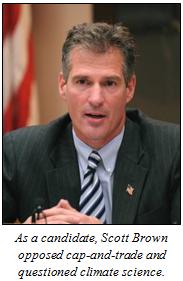By Kevin Mooney
After providing the decisive vote in favor of economically unsound legislation that would open the way for additional taxpayer-funded bailouts, Sen. Scott “it’s the people’s seat” Brown will have the opportunity to right his ship today when a resolution aimed at restoring democratic accountability is brought to the floor.
Sen. Brown is one of only three Republicans who have declined to co-sponsor a resolution that would negate the Environmental Protection Agency’s (EPA) scientifically-dubious endangerment finding that declared carbon dioxide a pollutant. The measure cannot be filibustered and needs just 51 votes to win approval.
With public support for “cap and trade” schemes collapsing, the Obama Administration is working aggressively to impose environmental regulations without Senate approval. Sen. Lisa Murkowski (R-Alaska), who introduced S.J. Res. 26, has made it clear that her resolution was not designed as a referendum on the science of global warming but rather as a safeguard against extra-constitutional administrative activity that intrudes upon congressional authority.
Brown’s home state figures prominently in the equation here in that it was the 2007 Massachusetts v. EPA U.S. Supreme Court ruling that has helped fuel the EPA’s regulatory overreach. The court ruled that the agency needed to bring its practices more in line with the requirements of the Clean Air Act (CAA) but did not outline any specific regulatory requirements.
Nevertheless, the EPA responded last December with the endangerment finding that declared greenhouse gas emissions endanger public health and welfare and must therefore be subjected to federal intervention. The end result could be the imposition of an unprecedented regulatory regime that is far more costly and intrusive than the anti-energy legislation that has thus far been blocked in the U.S. Senate.
It is difficult to overstate how expansive and restrictive government-imposed controls on economic activity could be, if the endangerment is permitted to stand. For starters, the federal EPA and its state counterparts will need to accommodate an estimated 41,000 Prevention of Significant Deterioration (PSD) pre-construction permits annually as opposed to 280 it currently digests and over 6 million Title V operating permits per year versus 14,700.
This means a long and copious list of previously unregulated entities such as office buildings, apartment complexes, small manufacturers and small kitchens would come under government control. To alleviate the backlog, the EPA has proposed a “tailoring rule” to restrict the new regulations to large facilities. This is problematic in that the rule may not be legal under the CAA and could be overturned in court. However, even if the tailoring rule withstands a legal challenge, the EPA will proceed to regulate smaller emission sources within a few years. This exercise cuts to the heart of why the Murkowski resolution is so critical. Essentially, the EPA stands poised to amend a statute without congressional consent in the name of environmentalism.
“To pound the square peg of climate policy into the round hole of the Clean Air Act, EPA has to play lawmaker and effectively change the statute,” Marlo Lewis, a senior fellow with The Competitive Enterprise Institute (CEI) has observed. “This breach of the separation of powers only compounds the constitutional crisis inherent in EPA’s hijacking of fuel economy regulation and climate policymaking.”
While debating his Democratic opponent in the run up to his state’s special election in January, Brown earned widespread acclaim for his astute response to a condescending query from one David Gergen, who served as a moderator.
Gergen asked if Brown really wants to sit in the late Sen. Ted Kennedy’s Senate seat and block health care reform, knowing it probably won’t happen for quite a while if it doesn’t happen now; Brown respectfully corrected him on whose seat it is.
“Are you willing, under those circumstances, to say I’m gonna be the person, I’m gonna sit in Teddy Kennedy’s seat, and I’m gonna be the person that’s gonna block it for another 15 years,” Gergen asked.
Brown’s response: “Well, with all due respect, it’s not the Kennedys’ seat, and it’s not the Democrats’ seat, it’s the people’s seat…”
But that people’s seat will be diluted of any representational meaning if the Obama Administration has its druthers. This is why Brown has a special charge to vote in favor of the Murkowski resolution.
As a candidate, Brown promised that “I oppose a national cap and trade program because of the higher costs that families and businesses would incur.” And in a debate, he said of the science behind man-made global warming, “I think the globe is always heating and cooling. It’s a natural way of ebb and flow. The thing that concerns me lately is some of the information I’ve heard about potential tampering with some of the information.’’
If so, Brown should also be in favor of preventing the EPA from implementing restrictions on carbon emissions based on controversial science that may not even be accurate. This is his chance.
Kevin Mooney is a contributing editor at NetRightDaily.com and the Executive Editor of TimesCheck.com.


